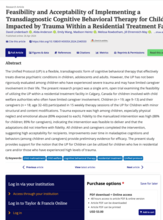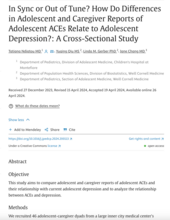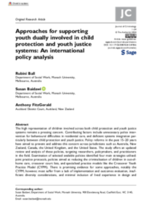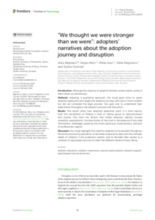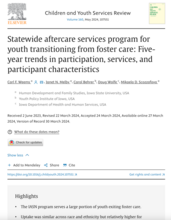Displaying 81 - 90 of 2510
This research project was an open trial examining the feasibility of utilizing the Unified Protocol (UP) -- a form of cognitive behavioral therapy -- within a residential treatment facility in Calgary, Canada for children involved with child welfare authorities who often have limited caregiver involvement.
The purpose of this U.S.-based study was to compare adolescent and caregiver reports of adolescent adverse childhood experiences (ACEs) and their relationship with current adolescent depression and to analyze the relationship between ACEs and depression.
Human trafficking and migrant smuggling are multi-billion-dollar businesses that have changed dramatically in recent years, driven by global challenges such as war, large migration and refugee flows, cybercrime, climate change and the COVID-19 pandemic.
Faith to Action have developed a 3-day in-person event for U.S.-based organizations serving orphaned and vulnerable children around the world. The purpose of this event is to enhance your learning and connections in the journey of transitioning from residential care to family-based care.
This study offers an updated review and analysis of policy reforms across both the child protection and youth justice systems in jurisdictions such as Australia, New Zealand, Canada, the United Kingdom, and the United States, targeting researchers, policymakers, and practitioners in the field.
Adopting a qualitative approach, this study gave voice to seven adoption applicants in Romania who began the adoption journey with one or more children but did not complete the legal process. The goal of the researchers was to understand their experiences throughout the adoption process and disruption. The present study is part of a larger research project that focused on the resilience of the adoptive family in Romania.
A federal judge is expected to rule soon on whether the government must provide shelter, food and medical care to minors while they await processing.
The purpose of this study was to examine trends in participation and understand the experiences of youth transitioning from foster care who were involved in the Iowa Aftercare Services Program.
This convergent mixed methods study builds knowledge surrounding preparedness among a sample of young adults with histories in out-of-home care in the U.S.
After he was snatched, Antonio Salazar-Hobson didn’t see his family for 24 years. His desire to return to his mother, and his discovery of a higher purpose, helped him navigate a path through hell.

